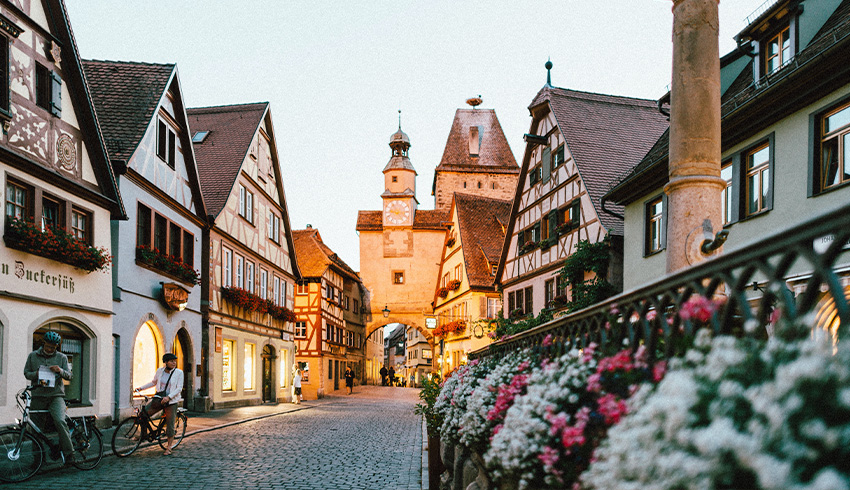Germany is heading toward a crucial election in February amid a turbulent political and economic landscape that challenges its traditional stability. The dissolution of parliament, the rise of the far-right, and the collapse of Chancellor Olaf Scholz’s coalition have turned the electoral process into a turning point for Europe’s largest economy.
Germans will head to the polls at a time of uncertainty and social tensions. The country faces significant challenges, such as the impact of the energy crisis, the rising cost of living, the weakening of industry, and the heated debate over immigration. This context fuels a polarized environment, where the traditional balance between centrist parties is threatened by the rise of radical right-wing groups.
For the first time in recent German history, the far-right party Alternative for Germany (AfD) has a real chance of securing second place in the election. This advancement reflects changes in German society and raises questions about the country’s political future.

The proximity of the elections has brought a wave of demonstrations across the country. In cities like Berlin and Cologne, thousands took to the streets to express opposition to the rise of the AfD and defend democratic and progressive values.
The protests intensified after an investigation by the Correctiv portal revealed a secret meeting between AfD members, businessmen, and far-right extremists, in which plans for mass deportations of immigrants were discussed. The discovery prompted an immediate response from civil society and increased pressure on Alice Weidel’s party.
On the other hand, the demonstrations were not limited to the progressive camp. The far-right also mobilized its supporters with packed political rallies. In the city of Halle, in the center of the country, around 4,500 people attended an AfD rally, marking the official start of the campaign. Weidel received a supportive call from billionaire Elon Musk, who has positioned himself against more open immigration policies in Europe.
This scenario illustrates the growing polarization of German politics. The country, which has long been a bastion of liberal democracy in Europe, is now experiencing a deeper divide among voters, reflecting trends observed in other European countries.
The dissolution of the Bundestag and the anticipation of elections were consequences of a prolonged political crisis that affected Chancellor Olaf Scholz’s government.
The so-called “traffic light” coalition — formed by the Social Democratic Party (SPD), the Greens, and the Free Democratic Party (FDP) — was created in 2021 with the goal of replacing the long government of conservative Angela Merkel. The promise was stability and modernization, but international events and internal divisions undermined the alliance.
The war in Ukraine and the ensuing energy crisis shook the German economy, leading to higher living costs and a prolonged recession. The country’s heavy reliance on Russian natural gas forced the government to seek alternatives, but the solutions were slow and insufficient to prevent negative impacts on industry and citizens’ wallets.
Internally, the coalition faced difficulties on issues such as the budget, energy transition, and fiscal policy. According to Professor Bruno de Castanho Silva from the Free University of Berlin:
In December, the FDP withdrew from the coalition, removing its 88 members from the government and leaving Scholz without a majority in the Bundestag. Without enough support to govern, Scholz faced a vote of confidence and was defeated, becoming the most unpopular chancellor in Germany since 1949.
As a result, President Frank-Walter Steinmeier dissolved parliament and scheduled new elections for February 23.
The election race puts the future of Germany at stake in a time of global transition. Four names stand out as major candidates:
- Olaf Scholz (SPD): Despite his unpopularity, he seeks re-election through the Social Democratic Party. He faces enormous challenges, such as the lack of popular support and the wear and tear of his administration.
- Friedrich Merz (CDU/CSU): A representative of the center-right and Angela Merkel’s political successor. He advocates for a more austere government and seeks to restore middle-class trust.
- Robert Habeck (Greens): Minister of the Economy and an influential figure in the Scholz government, trying to consolidate the party’s environmental and progressive agenda.
- Alice Weidel (AfD): The far-right candidate, relying on an anti-immigration and anti-establishment rhetoric to attract dissatisfied voters.
Polls show Friedrich Merz and his CDU/CSU alliance in the lead, with around 30% of the vote intentions. The AfD comes in second, with 21%, a significant rise reflecting popular discontent. Scholz’s SPD languishes in third place, with only 16%, its worst historical result.
The economy is one of the key themes of the campaign. Germany faces two consecutive years of GDP contraction, industrial closures, and a significant increase in unemployment.
The crisis has several causes:
- The rise in energy prices following the rupture of ties with Russia.
- The rise of the Chinese industry, which has surpassed Germany in electric vehicle production.
- The decline in exports, which directly impacts the country’s growth.
According to a survey by the Forschungsgruppe Wahlen institute, 35% of the population sees the economy as their primary concern, making this a decisive factor in choosing the next chancellor.
Another central issue is immigration. Germany hosts more than 3 million refugees, many of whom arrived during Merkel’s government. The AfD has exploited this issue, promising stricter restrictions.
Conservative proposals, such as the creation of accelerated deportation zones, have gained support within the Bundestag, even among traditional parties like the CDU. This hardening reflects a broader European trend, also seen in Italy, Austria, and the Netherlands.
The result of the election could redefine the country’s direction. If Friedrich Merz wins, Germany will likely follow a path of austerity and more conservative policies. If the AfD achieves a strong showing, there may be a realignment of political forces, making governance more difficult.
The February election will be one of the most impactful in Germany’s recent history. At stake is not only the country’s leadership but also the political and economic model that will shape its trajectory for the coming decades.

